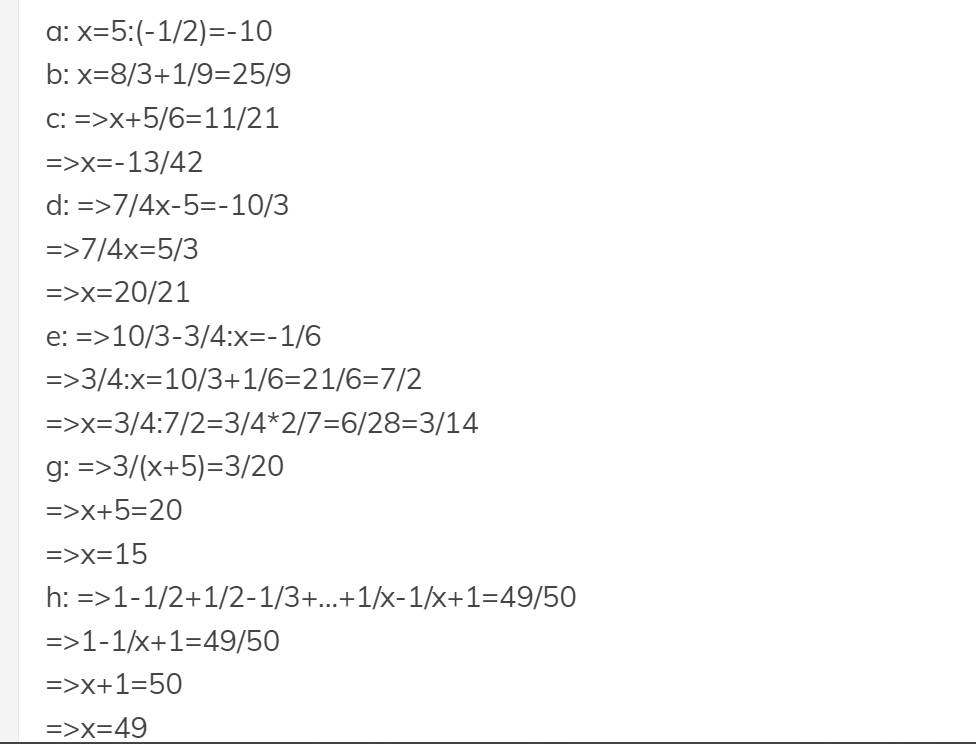(x-3)^3-(x-4)(x^2+4x+16)=49
Hãy nhập câu hỏi của bạn vào đây, nếu là tài khoản VIP, bạn sẽ được ưu tiên trả lời.


a) = (x+3).(x-3)^2-(x-3)(x+3)^2
=(x^2-9)(x-3)-(x^2-9)(x+3)
=(x^2-9)(x-3-x-3)
=-6(x^2-9)
các câu còn lại tương tự
\(a,\left(x+3\right)\left(x^2-3x+9\right)-\left(x-3\right)\left(x^2+3x+9\right)\)
\(=x^3+3-\left(x^3-3\right)\)
\(=x^3+3-x^3+3\)
\(=6\)
\(b,\left(x-5\right)\left(x^2+5x+25\right)-\left(x+5\right)\left(x^2-5x+25\right)\)
\(=x^3-5^3-x^3-5^3\)
\(=-125-125\)
\(=-250\)

m) \(\dfrac{1}{4}x^2-4x^2=\left(\dfrac{1}{2}x-2x\right)\left(\dfrac{1}{2}x+2x\right)\)
n) \(\dfrac{4}{49}-4x^2=\left(\dfrac{2}{7}-2x\right)\left(\dfrac{2}{7}+2x\right)\)
o) \(\left(x-3\right)\left(x+3\right)=x^2-9\)

a: Ta có: \(\left(x+2\right)\left(x^2-2x+4\right)-x\left(x^2+2\right)=15\)
\(\Leftrightarrow x^3+8-x^3-2x=15\)
\(\Leftrightarrow2x=-7\)
hay \(x=-\dfrac{7}{2}\)
b: Ta có: \(\left(x-2\right)^3-\left(x-4\right)\left(x^2+4x+16\right)+6\left(x+1\right)^2=49\)
\(\Leftrightarrow x^3-6x^2+12x-8-x^3+64+6\left(x+1\right)^2=49\)
\(\Leftrightarrow-6x^2+12x+56+6x^2+12x+6=49\)
\(\Leftrightarrow24x=-13\)
hay \(x=-\dfrac{13}{24}\)

a: x-56:4=16
nên x-14=16
hay x=30
b: \(101+\left(36-4x\right)=105\)
\(\Leftrightarrow36-4x=4\)
hay x=8
Vì a: x-56:4=16
=>x-14=16
Hay:x=30
Vì b: 101+(36−4x)=105101+(36−4x)=105
⇔36−4x=4⇔36−4x=4
Hay:x=8
Vậy x={30:8}
Nếu sai thì thui nhá,đừng chửi mình!

a, 4x2 - 49 = 0
⇔⇔ (2x)2 - 72 = 0
⇔⇔ (2x - 7)(2x + 7) = 0
⇔{2x−7=02x+7=0⇔⎧⎪ ⎪⎨⎪ ⎪⎩x=72x=−72⇔{2x−7=02x+7=0⇔{x=72x=−72
b, x2 + 36 = 12x
⇔⇔ x2 + 36 - 12x = 0
⇔⇔ x2 - 2.x.6 + 62 = 0
⇔⇔ (x - 6)2 = 0
⇔⇔ x = 6
e, (x - 2)2 - 16 = 0
⇔⇔ (x - 2)2 - 42 = 0
⇔⇔ (x - 2 - 4)(x - 2 + 4) = 0
⇔⇔ (x - 6)(x + 2) = 0
⇔{x−6=0x+2=0⇔{x=6x=−2⇔{x−6=0x+2=0⇔{x=6x=−2
f, x2 - 5x -14 = 0
⇔⇔ x2 + 2x - 7x -14 = 0
⇔⇔ x(x + 2) - 7(x + 2) = 0
⇔⇔ (x + 2)(x - 7) = 0
⇔{x+2=0x−7=0⇔{x=−2x=7

a: x=5:(-1/2)=-10
b: x=8/3+1/9=25/9
c: =>x+5/6=11/21
=>x=-13/42
d: =>7/4x-5=-10/3
=>7/4x=5/3
=>x=20/21
e: =>10/3-3/4:x=-1/6
=>3/4:x=10/3+1/6=21/6=7/2
=>x=3/4:7/2=3/4*2/7=6/28=3/14
g: =>3/(x+5)=3/20
=>x+5=20
=>x=15
h: =>1-1/2+1/2-1/3+...+1/x-1/x+1=49/50
=>1-1/x+1=49/50
=>x+1=50
=>x=49

1, \(x^2\) - 9 = 0
(\(x\) - 3)(\(x\) + 3) = 0
\(\left[{}\begin{matrix}x-3=0\\x+3=0\end{matrix}\right.\)
\(\left[{}\begin{matrix}x=3\\x=-3\end{matrix}\right.\)
vậy \(x\) \(\in\) {-3; 3}
5, 4\(x^2\) - 36 = 0
4.(\(x^2\) - 9) = 0
\(x^2\) - 9 = 0
(\(x\) - 3)(\(x\) + 3) = 0
\(\left[{}\begin{matrix}x-3=0\\x+3=0\end{matrix}\right.\)
\(\left[{}\begin{matrix}x=3\\x=-3\end{matrix}\right.\)
Vậy \(x\) \(\in\) {-3; 3}

Ta có: \(\left(x-3\right)^2-\left(x-4\right)\left(x^2+4x+16\right)=49\)
\(\Leftrightarrow x^3-9x^2+27x-27-x^3+64=49\)
\(\Leftrightarrow-9x^2+27x-12=0\)
\(\Leftrightarrow-3\left(x^2-9x+4\right)=0\)
\(\Delta=\left(-9\right)^2-4\cdot1\cdot4=81-16=65\)
Vì Δ>0 nên phương trình có hai nghiệm phân biệt là:
\(\left\{{}\begin{matrix}x_1=\dfrac{9-\sqrt{65}}{2}\\x_2=\dfrac{9+\sqrt{65}}{2}\end{matrix}\right.\)